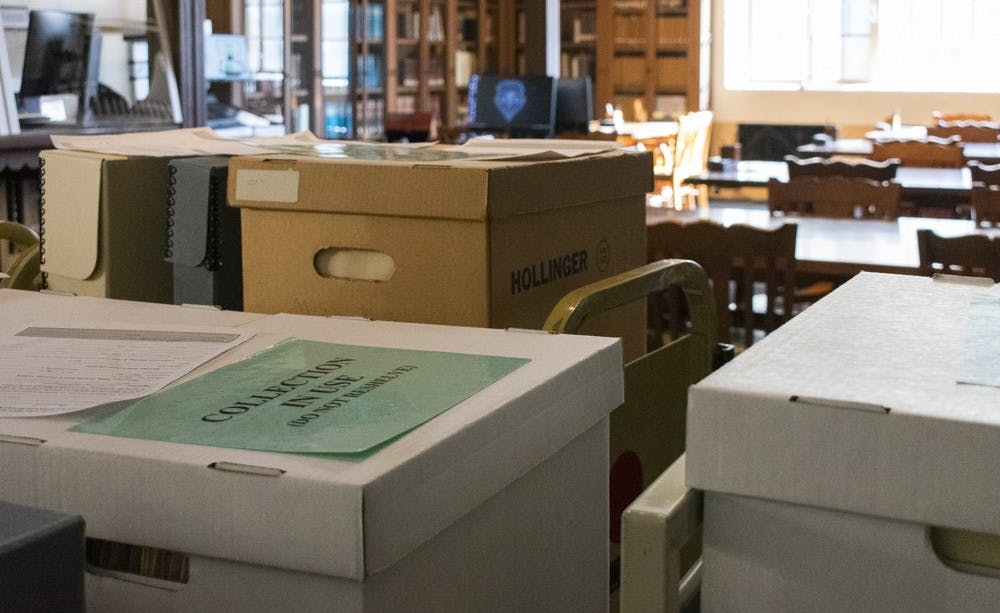In November 2022, the Center for Southwest Research at the University of New Mexico opened the Carl N. Gorman and William Dean Wilson Collections, presenting the materials and records of two original Navajo Code Talkers from the largest donation of Indigenous history materials ever received by the CSWR.
Zonnie Gorman, a doctoral candidate within the UNM history department whose research focuses on the Navajo Code Talkers, discussed her journey maintaining the materials of her father and uncle, Carl Gorman and William Dean Wilson, two original Navajo Code Talkers. The process of bringing these materials to the Center of Southwest Research took between two to three years, according to Gorman.
“As a student at UNM, I started a conversation with the Center of Southwest Research and at first, I wasn’t really feeling comfortable with it,” Gorman said. “ The people I had talked with at that time were treating it like any other collection and not with the respect it needed, and they were only interested in select items.”
Oftentimes, Indigenous peoples recorded in American history are compacted into an imperialist narrative which continues the assimilation processes that all Indigenous communities still experience today, according to Gorman. This was something that contributed to her decision on which institution to trust with her father’s and Wilson’s materials.
Prior to deciding on donating her materials to the CSWR, Gorman considered donating them to the University of California-Davis, where her father Carl Gorman was a part of the first four founding faculty members of the Native American studies program.
“I looked into Arizona and New Mexico. Both schools wanted to chop it up, as they were just interested in him as a Code Talker and not as a person,” Gorman said. “ So I didn't bother with it: I continued to work on my degree.”
She ended up reopening the conversation with the CSWR after some time, partially after connecting with fellow historian and archivist for the center Chris Geherin.
“Big changes (are coming) as archives are evolving — as they should — (and) we want more and more to give Native peoples the voice in terms of how their collections are archived and where it is archived,” Geherin said. “That process is different than it used to be.”
In the last few years, the CSWR has endorsed the inclusion of Indigenous peoples’ protocols during the archival process.
“Archives are changing by including the endorsement of protocols for Indigenous archival materials, which formalizes the idea that Indigenous peoples should have the strongest voice in terms of deciding how their collections will be archived,” Geherin said.
This focus meant the Center was having many conversations with Gorman to make sure her wishes for the collections were understood.
Get content from The Daily Lobo delivered to your inbox
When talking about her father and uncle, Gorman made note of their prominence outside of the Code Talkers. Both collections include things like letters, photos and documents from their lives, including from their period in the military.
“(Wilson) definitely wanted to be remembered,” Gorman said. “He carried (his camera) everywhere, and I never really remembered him taking pictures, but when I was looking at this collection, I was like, ‘Oh my god.’ It wasn't that he was taking pictures of landscapes: he was chronicling himself and his life.”
Included in Wilson’s collection are medals earned by Wilson from his participation in pistol and rifle competitions and over 1,400 photographs that chart his life from childhood, his service during World War II and his life after the war up until his death.
Wilson’s collection contains six boxes and is available to look at with permission from Gorman. The Carl Gorman collection is currently still being processed, with about 52 boxes of materials, according to Gorman.
The CSWR specializes in preserving historical manuscripts, books, photographs, architectural drawings, recordings, and other library materials relating to New Mexico, the Southwestern U.S. and Latin America. It also houses the UNM university archives, as well as a collection of rare books on various topics from around the world. All collections are accessible to students.
“I don't think they have a lot of, if any, individual Indigenous collections that serve as a historical perspective to us,” Gorman said. “This offers a place where we can celebrate our commonalities, but also to celebrate our differences — one of those differences saved our country.”
Cyrrene Giaccardo is a freelance reporter at the Daily Lobo. They can be reached at culture@dailylobo.com






